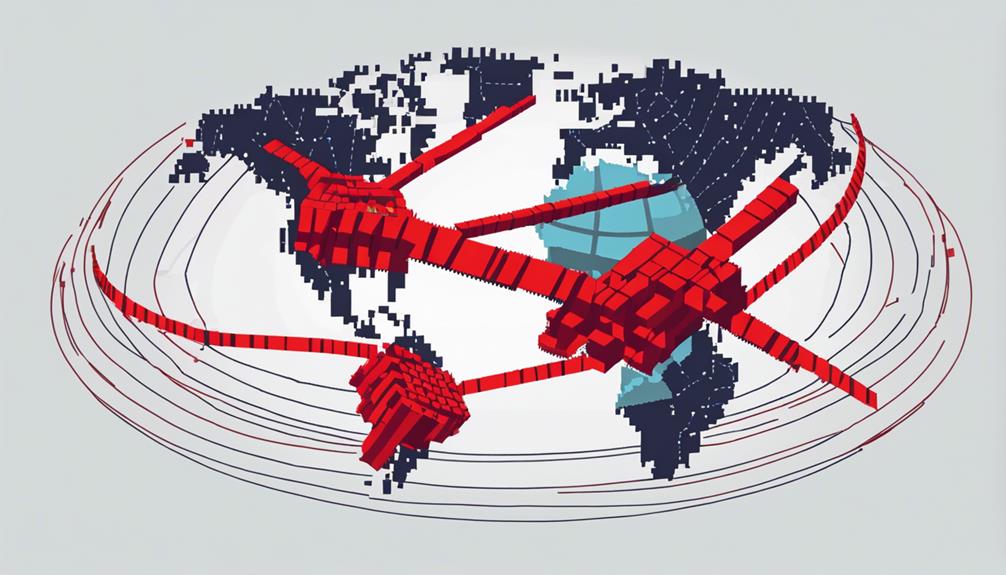In the realm of global satellite internet provision, a complex web of regulatory challenges entwines the operations of providers on an international scale. From the intricate dance of spectrum allocation to the labyrinth of licensing intricacies and the omnipresent specter of compliance with varied international regulations, the landscape is fraught with obstacles. These challenges demand a nuanced approach, strategic foresight, and a deft hand at maneuvering through the ever-shifting sands of regulatory frameworks. Stay tuned as we unravel the intricate tapestry of regulatory challenges faced by global satellite internet providers.
Key Takeaways
- Compliance with diverse national regulations is essential for global satellite internet providers.
- Spectrum management and interference mitigation are crucial for optimal service performance.
- Privacy concerns and data protection must be addressed to safeguard user information.
- Adherence to international standards and licensing procedures is vital for operational assurance.
Regulatory Landscape for Satellite Internet Providers

The regulatory landscape for satellite internet providers presents a complex array of diverse national regimes, necessitating meticulous compliance efforts and adherence to stringent licensing requirements. Satellite internet companies face significant regulatory challenges due to the global nature of their operations and the deployment of Low Earth Orbit (LEO) satellites to provide Global Broadband services. These challenges include ensuring compliance with different countries' regulations, managing spectrum allocation efficiently, and avoiding interference with existing services.
LEO satellites, which operate closer to Earth compared to traditional geostationary satellites, offer increased data speeds and lower latency, making them an attractive option for delivering high-speed internet globally. However, their deployment requires careful consideration of regulatory requirements to prevent overcrowding of orbital slots and ensure the sustainable use of spectrum resources.
Global Broadband services provided by satellite internet companies necessitate compliance with international regulations to meet the growing demand for connectivity worldwide. This involves navigating through a complex web of licensing procedures, spectrum management policies, and coordination with regulatory bodies to operate legally and effectively across borders. As the demand for internet connectivity continues to rise, addressing regulatory challenges becomes crucial for satellite internet providers to expand their services globally and deliver reliable connectivity to underserved regions.
Licensing Requirements and Restrictions
Navigating the intricate landscape of licensing requirements and restrictions poses a formidable challenge for global satellite internet providers. The regulatory challenges faced by these providers stem from the diverse licensing procedures imposed by different countries. Licensing requirements for satellite broadband vary significantly worldwide, impacting the deployment and operation of satellite internet services. Some nations enforce strict restrictions on satellite spectrum usage, which can impede the expansion of satellite broadband networks.
To illustrate the complexity of licensing requirements and restrictions for global satellite internet providers, the table below outlines key points:
| Licensing Requirements | Restrictions on Spectrum Usage |
|---|---|
| Vary by country | Some countries impose strict limits |
| Essential for market entry | Hinders satellite broadband deployment |
| Compliance is crucial | Impacts service quality |
| Can delay network deployment | Diverse licensing procedures |
| International regulations | Legal operation assurance |
Compliance with these regulations is essential for satellite internet providers to ensure operational legality and prevent penalties. Understanding and navigating the intricate licensing landscape is paramount for the success of satellite broadband services on a global scale.
Spectrum Allocation and Interference Issues

Efficient management of spectrum allocation is paramount for global satellite internet providers in ensuring optimal operational performance and mitigating interference challenges. The regulatory challenges surrounding spectrum allocation and interference issues are critical for the seamless functioning of satellite internet services. Here are some key points to consider:
- Equitable Distribution: Satellite internet providers face the challenge of securing fair and sufficient frequencies for their services amidst competing demands from various industries utilizing the spectrum.
- Crowded Spectrum Environment: Interference problems are exacerbated by the increasingly crowded spectrum environment, necessitating the implementation of effective mitigation strategies to maintain signal integrity.
- Global Regulatory Variations: Varying regulations on spectrum allocation across different countries can impact the ability of satellite internet providers to operate efficiently on a global scale, requiring them to navigate a complex web of rules and restrictions.
- Compliance Requirements: Adherence to international standards is crucial for satellite internet providers to prevent signal interference with terrestrial and other satellite systems, ensuring harmonious coexistence within the spectrum.
- Operational Efficiency: Efficient spectrum management is essential for the smooth operation of satellite internet services, enabling providers to optimize their network performance and avoid conflicts with other communication technologies.
Compliance With International Standards
Compliance with international standards in spectrum management is foundational for global satellite internet providers seeking to ensure operational integrity and regulatory adherence. Global satellite internet providers are required to adhere to ITU regulations for spectrum usage and orbital slot assignments. The ITU Radio Regulations play a crucial role in governing frequency coordination to mitigate interference among different satellite systems operating in the same or adjacent frequency bands. Furthermore, compliance with international spectrum sharing agreements is paramount to guarantee equitable access and foster fair competition within the satellite industry.
To emphasize the significance of compliance with international standards, the following table illustrates the regulatory challenges faced by satellite operators in meeting these standards:
| Challenges | Description | Impact |
|---|---|---|
| Harmonizing Licensing Procedures | Satellite operators struggle to align licensing procedures across various countries' regulatory frameworks. | Delays in market entry and service deployment. |
| Orbital Debris Mitigation | Ensuring compliance with international standards for debris mitigation to maintain satellite operation sustainability. | Reducing risks of collisions and space debris proliferation. |
| Spectrum Sharing Agreements | Meeting requirements of spectrum sharing agreements to support fair competition and access in the satellite industry. | Ensuring equitable distribution of resources and opportunities. |
Adhering to these international standards not only fosters a conducive regulatory environment but also promotes the long-term sustainability and growth of global satellite internet services.
Governmental Control and Privacy Concerns

The intersection of governmental control and privacy concerns in the realm of global satellite internet services poses intricate challenges for providers seeking to safeguard user data integrity amidst varying national regulations and potential surveillance implications. Global satellite internet providers are confronted with regulatory challenges and privacy concerns that stem from governmental control over satellite internet services. This dynamic landscape necessitates a comprehensive approach to address privacy concerns while ensuring compliance with diverse privacy regulations across jurisdictions.
- Governmental control over satellite internet can impact data privacy and security for users.
- Privacy concerns arise due to potential government surveillance and data monitoring through satellite internet.
- Global satellite internet providers must navigate varying national regulations on data protection and privacy.
- Satellite internet providers face challenges in ensuring user privacy and data security across different jurisdictions.
- Compliance with diverse privacy regulations is essential for satellite internet providers to address governmental control concerns.
Providers must adopt robust data protection measures, encryption protocols, and transparency practices to mitigate privacy risks associated with governmental control. By proactively engaging with regulatory bodies, implementing privacy-by-design principles, and enhancing user awareness, satellite internet providers can effectively manage governmental control and privacy concerns in the ever-evolving landscape of global satellite internet services.
Frequently Asked Questions
What Are the Challenges of Satellite Internet?
Bandwidth limitations, latency concerns, and coverage gaps are significant challenges faced by satellite internet providers. Service reliability can be affected by weather interference, impacting connectivity for users. Regulatory hurdles further complicate operations, requiring compliance with international standards. Mitigating these obstacles is crucial for providers to deliver consistent and dependable satellite internet services globally.
Which Is the Biggest Known Issue Specific to Satellite Internet Connections?
The biggest known issue specific to satellite internet connections revolves around interference concerns. Interference can disrupt signal transmission, affecting the reliability and quality of the internet connection. This challenge requires strategic mitigation efforts to minimize disruptions and ensure smooth operations. Latency issues and data caps are also critical factors impacting satellite internet performance, necessitating innovative solutions to address these limitations effectively.
What Are the Risks of Satellite Internet?
In the realm of satellite internet, risks manifest in the form of connection stability concerns, data caps limitations, and latency issues. Ensuring uninterrupted connectivity, managing data usage thresholds, and minimizing delays in data transmission are pivotal for satellite internet users. These challenges underscore the importance of advanced technology solutions and strategic operational protocols to address the complexities inherent in satellite internet services.
What Is the Biggest Disadvantage to Using Satellite Internet?
The biggest disadvantage of using satellite internet revolves around latency issues. This delay in data transmission can hinder real-time applications like online gaming and video calls. Additionally, satellite internet providers often impose data caps and coverage limitations, impacting the overall user experience. These factors collectively contribute to the challenges users face when relying on satellite internet services, highlighting the need for technological advancements to address these limitations effectively.
